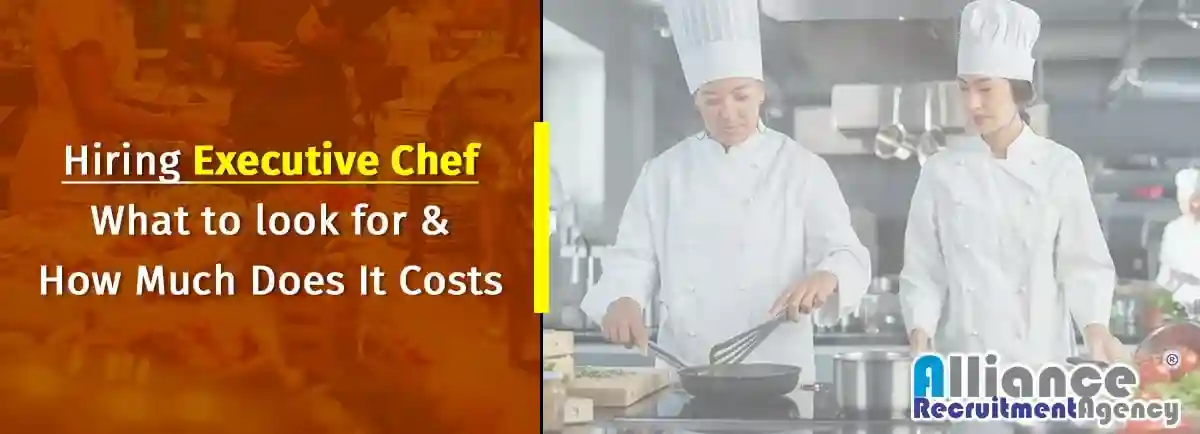Hiring Executive Chef: What to look for & How Much Does It Costs

An executive chef, also known as a Head Chef decision-making!
or chef manager is responsible for the overall culinary operation of a restaurant, hotel, or other food service establishment. The executive chef plays a crucial role in menu development, food preparation and presentation, and kitchen management.
They often work closely with the owner or manager to set the overall direction and goals for the food service operation and with the sous chef and other kitchen staff to ensure that daily operations run smoothly.
An executive chef must have a solid culinary background, excellent leadership skills, and the ability to manage a team and budget effectively. They also need to have a passion for food and the ability to create innovative and delicious dishes that will keep customers coming back for more.
Roles and Responsibilities
The role and responsibilities of an executive chef may vary depending on the size and type of establishment they are working in, but some everyday duties include:
Developing and creating menus: The executive chef is responsible for developing and creating the menu for the establishment, taking into account factors such as food trends, customer preferences, and budget.
Overseeing food preparation and presentation: The executive chef ensures that all dishes are prepared to the highest standards, using fresh and high-quality ingredients. They also play a crucial role in plating and presentation to ensure that the food looks attractive and tasty.
Managing the kitchen: The executive chef is responsible for managing and coordinating the work of the kitchen staff, including hiring, training, and supervising chefs, cooks, and other kitchen workers.
Managing the budget: The executive chef is responsible for managing the kitchen budget, including purchasing ingredients, equipment, and supplies.
Ensuring food safety: The executive chef ensures that the kitchen adheres to all food safety regulations and standards, including handling, storage, and food preparation.
Staying up-to-date on industry trends: The executive chef should be knowledgeable about current food trends and be able to incorporate these into the menu and operation of the kitchen.
Representing the establishment: The executive chef may also be responsible for representing the establishment at events, cooking demonstrations, and other public appearances.
Key Skills and Qualities to Look for in an Executive Chef
When looking for an executive chef, it is essential to look for candidates who have the following skills and qualities:
Culinary expertise: An executive chef should have a solid culinary background and be able to demonstrate their knowledge and skills through education, training, and work experience.
Leadership skills: An executive chef is responsible for managing and coordinating the work of the kitchen staff, so strong leadership skills are essential. This includes communicating effectively, delegating tasks, and making decisions.
Creativity: An executive chef should have a creative flair and be able to come up with new and innovative dishes that will keep customers coming back for more.
Attention to detail: An executive chef must have strong attention to detail and be able to produce consistently high-quality dishes.
Time management skills: An executive chef must manage their time effectively and juggle multiple tasks and deadlines.
Organizational skills: An executive chef must be organized and efficient and able to manage the kitchen budget, inventory, and equipment effectively.
Flexibility: An executive chef should be flexible and adaptable, able to handle unexpected challenges or changes in the kitchen.
Customer service skills: An executive chef should have excellent customer service skills and be able to work with the front-of-house staff to ensure that customers have a positive dining experience.
Passion for food: An executive chef should have a genuine love for food and a passion for creating delicious dishes.
Adaptability: An executive chef should be able to adapt to different environments, cultures, and types of cuisine, as well as be open to learning new cooking techniques and methods.
The Cost of Hiring an Executive Chef: Salary and Benefits
The Cost of chef employment agencies can vary depending on several factors, including the size and type of establishment, the chef’s level of experience and education, and the location of the job. According to data from the U.S. Bureau of Labour Statistics, the median annual wage for chefs and head cooks in the United States was around $50,000. However, executive chefs at high-end restaurants or hotels may earn significantly more, with some earning salaries in the six figures.
In addition to salary, executive chefs may also receive a range of benefits, including:
Health insurance: Many employers offer health insurance as a benefit to full-time employees, including executive chefs.
Retirement plans: Some employers offer retirement plans, such as a 401(k), to their employees, including executive chefs.
Executive chefs may be entitled to paid time off, including vacation, sick leave, and personal days.
Professional development opportunities: Some employers offer opportunities for professional development, such as culinary training or workshops, to their executive chefs.
Meals: Many restaurants and hotels offer meals to their employees as a benefit, including executive chefs.
It’s important to note that the cost of hiring an executive chef may also include recruiting and hiring expenses, such as advertising and employment agency fees. Employers should consider these costs when budgeting for hiring an executive chef.
Tips for Retaining and Motivating an Executive Chef
Retaining and motivating an executive chef is essential for the success of a food service establishment, as it can help ensure a consistent level of culinary excellence and minimize disruption due to staff turnover. Here are some tips for retaining and motivating an executive chef:
Provide opportunities for growth and development: Executive Chef Dubai who feel they are learning and growing in their role are more likely to be motivated and engaged. Offer opportunities for culinary training, leadership development, and professional growth.
Foster a positive work culture: A positive work culture can help to create a sense of community and belonging among kitchen staff, which can be motivating. Encourage open communication, teamwork, and a supportive environment.
Offer a competitive salary and benefits package: Executive chefs who feel fairly compensated for their work are more likely to be motivated and committed to their job.
Conclusion
In conclusion, hiring an executive chef is a significant decision for any food service establishment. To succeed in the role, it is essential to choose a candidate with culinary expertise, leadership skills, and personal qualities.
The cost of hiring an executive chef can vary depending on several factors, including the size and type of establishment, the chef’s level of experience and education, and the location of the job. In addition to salary, executive chefs may also receive a range of benefits, such as health insurance, retirement plans, paid time off, professional development opportunities, and meals.
To retain and motivate an executive chef, it is essential to provide opportunities for growth and development, foster a positive work culture, offer a competitive salary and benefits package, recognize and reward excellence, provide resources and support, and encourage work-life balance. Consult with a global manpower agency!




